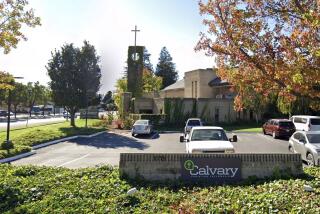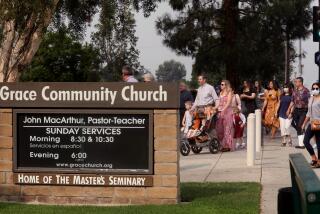IRS to Auction Property Seized From Evangelist Alamo for Debts
- Share via
The Internal Revenue Service said Friday it will begin auctioning hundreds of items, from real estate to keepsake photos, seized from evangelist Tony Alamo and his followers, capitalizing on a federal court’s ruling that the former fugitive’s church was a moneymaking operation that does not merit tax-exempt status.
The IRS--to satisfy a $7.9-million tax debt--has scheduled the first auction for March 31 in Clarksville, Ark., said IRS spokesman Dan Boone.
More than 400 items seized from stores, offices and residences used or operated by Alamo and his followers in Arkansas will be sold, he said. Auctions of real estate and other property in Tennessee and California will probably follow, Boone said.
The items to be sold in Arkansas range from church furniture to odds and ends--accent on the odd. A four-page IRS inventory includes a church pulpit, altar and 82 pews as well as 28 mirrors, including one broken one, several photos of Tony Alamo, including two with actor Larry Hagman, a back massager and a piece of driftwood.
There is also a souvenir dish inscribed “Remember the Alamo” and a director’s chair bearing the name of Alamo, who pronounces it Ah-lah-mo, with the accent on the second syllable.
Alamo, who is also awaiting trial in San Fernando Superior Court on child-abuse charges, could not be located for comment. He is believed to be living in California, but calls placed to church telephone numbers in Los Angeles and Fort Smith, Ark., were not returned.
Boone said the proceeds will go toward paying tax liens filed against the church, known as the Tony and Susan Alamo Foundation. Susan Alamo died in 1982. The IRS stripped the church, founded by the couple in Hollywood nearly 25 years ago, of its tax-exempt status in 1985.
Alamo appealed the IRS ruling but on Wednesday a two-judge U. S. Tax Court in Los Angeles rejected the appeal.
The ruling declared: “In the final analysis, Tony and Susan were the foundation, hopelessly intertwined with no separate identity, orchestrating a huge business organization . . . for their personal benefit.”
The ruling said the church’s purpose “was to provide sustenance to its members and economic wealth to Tony and Susan.”
Instead of being a “communal group only tangentially engaged in unrelated trades or businesses,” the ruling concluded, the Alamo church “was akin to a city of full-time workers, who also happened to pray together.”
Boone said the tax court ruling was coincidental to the auction, which had already been planned by the IRS. However, he said, the ruling strengthens IRS contentions that the many businesses Alamo followers have operated--from restaurants to clothing factories and sales outlets--are all part of his church organization and subject to seizure to pay tax liens.
The tax court’s ruling shows that “all of these entities are interconnected,” Boone said. “This bolsters our position on the collection side.”
Boone said Alamo remains popular in the Ozark Mountain region where the property was seized and the auction could draw some followers to bid on the items.
“We don’t have the desire to screen out anybody,” Boone said.
Property owned by the church and formerly used as a commune in remote Mint Canyon in Saugus has been seized by the IRS along with a lucrative clothing store in Nashville, Tenn., Boone said. Alamo-designed denim jackets--with lavish, sequined illustrations on the backs--sold in the 1980s for as much as $600 apiece.
Alamo, whose real name is Bernie L. Hoffman, founded the church with his wife in the late 1960s and began taking young dropouts, drug users and alcoholics off the streets of Hollywood and providing them with food, shelter and religious sermons. At times, hundreds of followers lived at the Mint Canyon commune.
Alamo later created communes and follower-operated businesses in Arkansas and Tennessee. His church is best known for circulating anti-Catholic literature and Alamo’s claims that his late wife would be resurrected. It has drawn the attention of cult-monitoring organizations and been the subject of numerous government investigations over the years.
After Alamo was charged with directing the beating of a child at the Saugus commune in March, 1988, he left the area and was hunted by federal agents as a fugitive until July 5, 1991, when he was arrested in Tampa, Fla.
Last year, five former followers won a $1.8-million judgment against Alamo in an Arkansas lawsuit that charged the church leader with stealing a trucking business from them and cheating them out of appropriate pay for work in the church’s businesses. Also last year, Alamo was acquitted of a charge that he threatened to kill the federal judge who heard that case.
More to Read
Inside the business of entertainment
The Wide Shot brings you news, analysis and insights on everything from streaming wars to production — and what it all means for the future.
You may occasionally receive promotional content from the Los Angeles Times.









